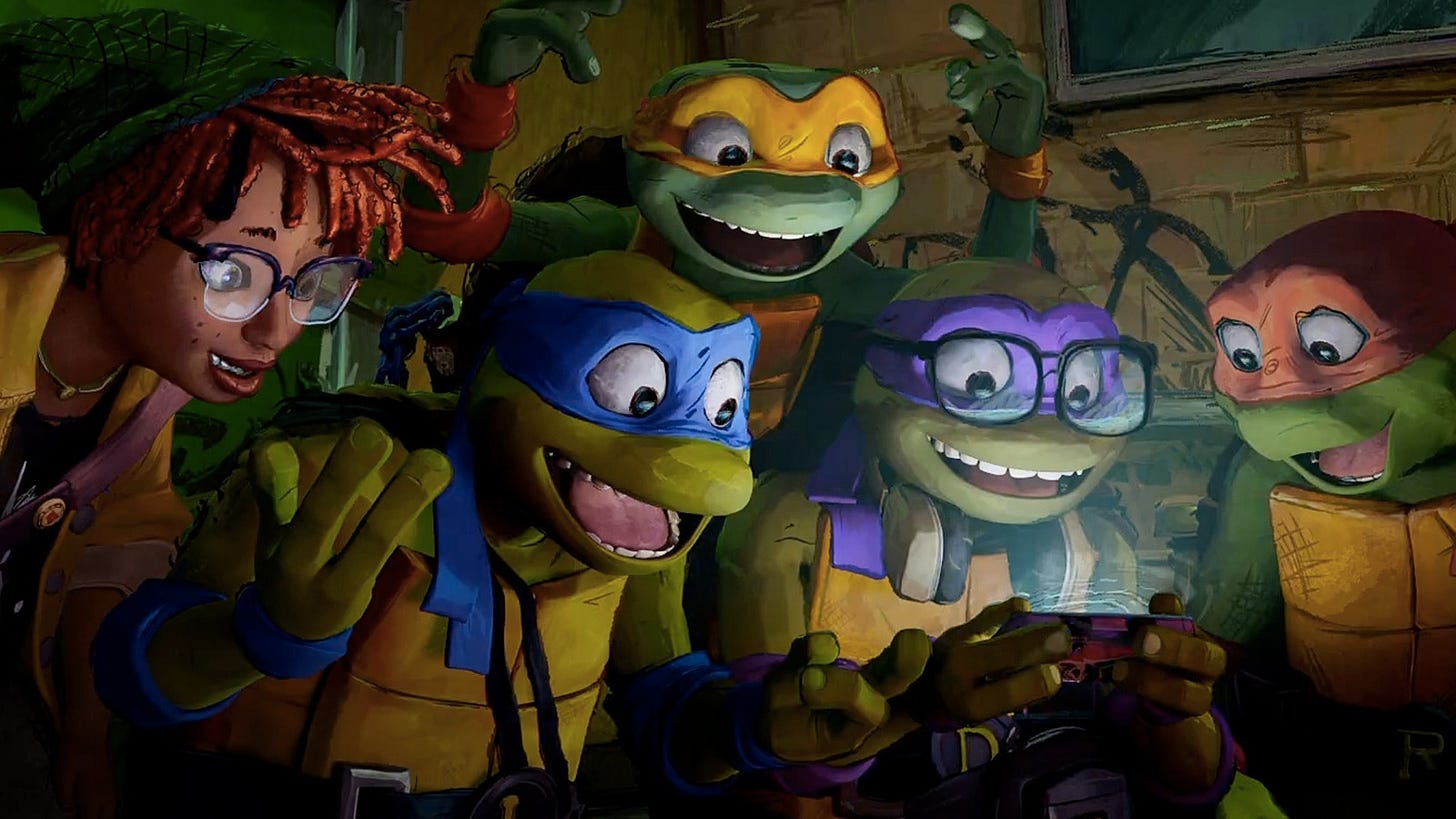In Review: 'Passages,' 'Teenage Mutant Ninja Turtles: Mutant Mayhem'
Two weeks after Barbenheimer, the summer of 2023 proves that it's still not out of gas.
Passages
Dir. Ira Sachs
92 min.
Ira Sachs’ Passages is a love triangle that sometimes feels like a horror movie, in that you want to scream, “Ahhh! Noooo! Get away from him!” at the screen, but the characters keep going upstairs or leaving their doors open. It would be reductive to call Tomas, the rapscallion played by Franz Rogowski, a traditional horror villain, if only because he’s such a familiar type, an emotional black hole that sucks in otherwise rational people. Passages is about the wreckage left behind by his destructive impulses, but Sachs isn’t content to think about Tomas as mere phenomenon. Tomas’ narcissism may wound those who get close to him, but they can eventually wriggle from his grasp. He doesn’t have the same luxury.
It feels almost like a private joke—or an act of extreme self-deprecation—for Sachs to make Tomas a film director by trade, but it also makes sense that a man who commands every aspect of a production seeks the same power off set. In the opening scene, Sachs presents the last day of Tomas’ latest shoot in Paris as dark comedy, with Tomas berating an actor repeatedly for not descending a short set of stairs correctly. (“Just walk down the staircase. It’s not that hard!”) At the wrap party, however, Tomas has no trouble mingling with Agathe (Adèle Exarchopoulos), a sexy Frenchwoman who has just broken up with her boyfriend and seems anxious for a rebound. The slight obstacle to this relationship is that Tomas is married to a man, Martin (Ben Whishaw), a mild-mannered Brit who seems wearily accustomed to his partner’s romantic whims.
One of the most cosmopolitan of American independent filmmakers, Sachs (Love is Strange, Little Men) intertwines three characters of different nationalities in the City of Love almost as a demonstration that fucked-up relationships have a universal quality to them. Sachs and his writing partner, Mauricio Zacharias, plant one big emotional IED in their story, but they are intent mostly to drop into this world in media res and allow us to puzzle through their characters’ motives and vulnerabilities. There are indications, for example, that Tomas and Martin’s marriage is already frayed to the breaking point when Tomas starts up with Agathe, and that affair nudges Martin toward a fling with a writer (Erwan Kepoa Falé) whose most recent novel is a doorstop of Infinite Jest proportions. (Tomas insisting that he hates the book, based on the first few pages, is comically petty.)
It’s tricky to understand the gravitational force that keeps Agathe and Martin in Tomas’ orbit, but that’s precisely the value of Passages, which does the hard work of clarifying relationships that don’t make much sense from the outside. Casting Rogowski, an actor of uniquely mesmeric charisma, in the central role makes the whole scenario seem more plausible, because he so easily slinks around the Kinsey scale. (A scene where Tomas returns from a ferocious bout of make-up sex with Martin to meet Agathe’s parents catches him hilariously mid-transition.) The challenge for Whishaw and Exarchopoulos is suggesting Martin and Agathe’s hopeless attraction to Tomas without making them look like fools.
And yet, they wouldn’t be the first fools in love. Passages doesn’t shy away from the physical component of these relationships, which earned the film an NC-17 rating that its distributor, Mubi, has opted to reject. (It’s galling that the sex scene that undoubtedly led to the rating is between two men, continuing the MPA’s gross history of treating queer relationships as transgressive.) Tomas is a good lover and he has a childlike neediness that can convince otherwise rational people that he’s a project worth taking on, that his self-involvement can be reformed somehow. Learning that it can’t is a hard lesson for Martin and Agathe both, but Sachs saves a little compassion for Tomas. You can move on from a relationship. But you can’t move on from yourself. — Scott Tobias
Passages opens in limited release tomorrow.
Teenage Mutant Ninja Turtles: Mutant Mayhem
Dir. Jeff Rowe
99 min.
Yesterday, Keith wrote about Wes Craven’s Red Eye as the model of August entertainment—a tight, satisfying 90 minutes, “just the right amount of air conditioning on a hot summer’s day.” Now the calendar has turned and August has kindly delivered another low-stakes, low-key, breezily pleasurable ninetysomething minutes in Teenage Mutant Ninja Turtles: Mutant Mayhem, an animated pop-culture bauble that’s admirable as much for its sense of proportion as for its sense of humor. Even if Seth Rogen’s name weren’t in the credits for co-writing (with his longtime partner Evan Goldberg and three others) the film and lending his voice to a mutant warthog, Mutant Mayhem could be identified as the type of comedy that reflects his long-running sensibility as a smart stoner and affable man-child. His hearty, infectious guffaw could have served as the laugh track.
It’s hard to believe that there have been six previous Ninja Turtle films, but seventh time’s the charm with Mutant Mayhem, which applies the funkiness and tactility of the Spider-Verse animated movies to a group of sewer-dwelling, pizza-loving adventurers whose superheroics are much less consequential. (With some power comes a little responsibility.) With minimal fuss and maximum efficiency, Mutant Mayhem zips through the Turtles’ origin story, showing baby siblings Michelangelo, Leonardo, Raphael and Donatello wriggling around in the puddle of green mutagen ooze that will turn them into humanoid warriors. While their adoptive rat father Splinter (a terrific Jackie Chan) raises them underground and teaches them ninjutsu, the sinister Techno Cosmic Research Institute (TCRI) works on weaponizing the ooze in a plot to enslave humanity.
New mutants of varied ilks surface for the inevitable battle royale that will call the Turtles into action—Rose Byrne, Hannibal Buress, John Cena, Ice Cube, Post Malone and Paul Rudd are among the recognizable voices—and Ayo Edebiri ties the plot together as April O’Neil, a student journalist who befriends our heroes while investigating TCRI. But the comic and emotional core of Mutant Mayhem comes from the interplay between the Turtles and the enticements of the human world, starting but not limited to an outdoor screening of Ferris Bueller’s Day Off.
Though Mutant Mayhem doesn’t feel as invested in its family dynamics as director Jeff Rowe’s previous film, The Mitchells vs. the Machines, it has a similar sweetness and soul to it that allays any concern that this might be another mediocre IP cash-in. The score, by Trent Reznor and Atticus Ross, has an edginess that’s counterbalanced by a buoyant soundtrack, loaded with hip-hop bangers by the likes of De La Soul and A Tribe Called Quest. And even when the plotting gets needlessly murky, with the kind of world-building that leads inevitably (or at least optimistically) to a franchise, Mutant Mayhem has the loose, cool, spontaneous quality of a film that’s been riffed together on the fly. That’s not the way animation works, of course, but the impression of a hand-crafted goof endures. Hang out, grab a slice and get out of the heat for a bit. — Scott Tobias
Teenage Mutant Ninja Turtles: Mutant Mayhem is playing in theaters everywhere.








You can keep your "Barbenheimer". I'm here for Passage Mutant Ninja Turtles: Mutant Mayhem Passages.
(I'm still working on the name.)
This very dumb comment, but every time me see abbreviation USWMT, me sing "US Women Ninja Turtles" and it fits theme song perfectly.